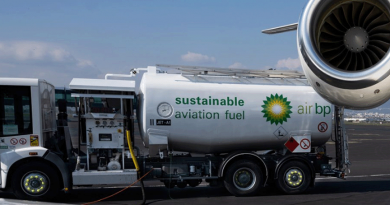Business aviation welcomes another milestone step in sustainable flight
Ed Bolen is President and CEO of the National Business Aviation Association (NBAA)
The global business aviation community continues to advance toward a more sustainable future. In the US, our industry recently earned a long-sought victory to promote greater use of sustainable aviation fuels (SAF) at a time when our industry is under more pressure than ever before to demonstrate its environmental credibility.
Partly derived from a diverse array of renewable sources, SAF holds the potential right now to reduce lifecycle carbon emissions from the aviation sector by as much as 80 percent, and work continues to improve on that impressive figure even more.
In August, US President Joe Biden signed the Inflation Reduction Act of 2022 into law. This new legislation included a blenders tax credit (BTC) for SAF producers, making them eligible for a $1.25 per gallon credit for each gallon of SAF sold as part of a qualified fuel mixture with a demonstrated lifecycle greenhouse gas (GHG) reduction of at least 50% compared to conventional jet fuel.
The stand-alone SAF tax credit, which goes into effect in January, increases by one cent for each percentage point by which the lifecycle GHG emissions reduction of such fuel exceeds 50 percent, up to $1.75 per gallon.
Implementation of this credit marks genuine progress toward increasing SAF production, promoting greater availability at general aviation airports and reducing costs to end users. As we’ve seen with similar tax credit programs for other alternative fuels like biodiesel, the BTC will markedly incentivize production of SAF, significantly expanding its availability while also helping to reduce costs for the fuel for flight operations.
This credit will run through the end of 2024. On 1 January 2025, the Clean Fuel Production Credit (CFPC) will apply to all transportation fuels, based on the level of GHG reduction performance of a fuel versus a baseline emissions factor. Under this system, SAF will be eligible for a credit of up to $1.75 per gallon for fuels with a 100% GHG reduction, with lower credits for fuels demonstrating lower levels of GHG reduction.
Efforts across the industry and around the globe
Without question, SAF offers operators a proven method to actively curb CO2 emissions and make business aviation flying even more efficient and more sustainable.
Implementation of the SAF BTC also marks another significant step in fulfilling our industry’s pledge to achieve net zero CO2 emissions by 2050 under the Business Aviation Commitment on Climate Change. First implemented in 2009 and renewed last year, this commitment addresses numerous ways in which business aviation stakeholders can reduce their carbon footprint.
From promoting more sustainable practices in everyday activities at business aviation flight departments to certifying new hangar construction to LEED (Leadership in Energy and Environmental Design) standards, our industry continues to make sustainability not just a buzzword, but an active priority across all facets of their operations worldwide.
Business aviation offers the unparalleled ability to link communities and companies around the world and connect companies and clients throughout North America, Europe and beyond
These measures complement new, more efficient aircraft designs and engines being rolled out by business aviation OEMs that allow companies to go farther on less fuel. Sustainability is also one of the factors spurring development in the emerging advanced air mobility (AAM) industry.
Powered largely by all-electric or hybrid-electric propulsion systems that offer the promise of drastically reduced CO2 and noise emissions over conventional rotorcraft, AAM offers new options for short- to medium-range trips, particularly in dense urban environments that may currently lack efficient transportation options.
Two key initiatives formed last year are furthering these efforts. The NBAA Sustainable Flight Department Accreditation Program advances a sustainability culture in business aviation organizations and recognize those that meet or exceed specified criteria in flight, operations, ground support and infrastructure.
Similarly, the NBAA Sustainability Subcommittee of the NBAA Maintenance Committee is working to develop educational resources to help business aircraft operators pursue initiatives to foster greater environmental awareness industrywide.
Sustainability in focus at NBAA-BACE
Advancing our industry’s sustainability is also a key theme at NBAA’s conventions and events. Last year in Las Vegas, we unveiled an all-new carbon-offset program to make the NBAA Business Aviation Convention and Exhibition (NBAA-BACE) one of the world’s largest carbon-neutral events. Nearly 100 exhibitors signed a Green Pledge to limit their environmental footprint throughout the show.
These programs will again be front-and-centre throughout the 2022 edition of NBAA-BACE, taking place October 18-20 in the Orange County Convention Center in Orlando, FL. Additionally, the Business Aviation Sustainability Summit, held in conjunction with the show, will spotlight the benefits of SAF and other methods by which business aviation flight operations may reduce their carbon footprint.
NBAA-BACE will also feature more than 30 education sessions focusing on the most important issues in business aviation today, from AAM to workforce issues to sustainability and much more.
The show will also include the latest and most advanced business aircraft available today alongside next generation hybrid- and electric-powered, vertical take-off and landing (eVTOL) AAM aircraft pointing to our industry’s promising and sustainable future.
Business aviation offers the unparalleled ability to link communities and companies around the world and connect companies and clients throughout North America, Europe and beyond. Our sustainability focus also highlights the many ways our industry continues to innovate, to inspire and to answer challenges in strong and resilient fashion. On behalf of the more than 10,000 members of NBAA, I invite the readers of World Commerce Review to consider attending NBAA-BACE, where you may experience first-hand our industry’s exciting, and sustainable future.




